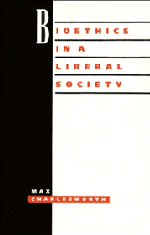6 - CONSENSUS IN A LIBERAL SOCIETY
Published online by Cambridge University Press: 03 May 2011
Summary
The liberal ideal and bioethical realities
At the end of The Republic Plato confesses that the state he has constructed is an ideal, a thought-experiment, and that it would be difficult, even impossible given human self-interest, to realise in practice. Nevertheless as a utopian political regime it has a purpose, Plato suggests, in that it enables us to measure actual political structures and processes against it. Plato's aim, of course, was to show that both tyranny at one extreme and popular or mob democracy at the other could never be just regimes, and that we need the paternalism of an elite group of ‘philosopher rulers’ to bring about a just society.
To some extent the ideal of the liberal society elaborated here, and its implications for bioethics, plays the same role as Plato's imaginary polis in that it enables us to assess the actual state of current bioethical discussion and practice in our society. In many liberal democratic societies the liberal values we have been discussing often exist in a compromised form and there are flagrant inconsistencies in the way those values are applied in bioethical practice. As a result, the respect for personal autonomy, the animating value of the liberal society, is often mixed with various forms of paternalism, both medical and bureaucratic; the state and the law often invade the realm of personal morality and act as moral policemen; the toleration of ethical pluralism is minimised in the name of social unity and cohesion.
- Type
- Chapter
- Information
- Bioethics in a Liberal Society , pp. 160 - 168Publisher: Cambridge University PressPrint publication year: 1993



